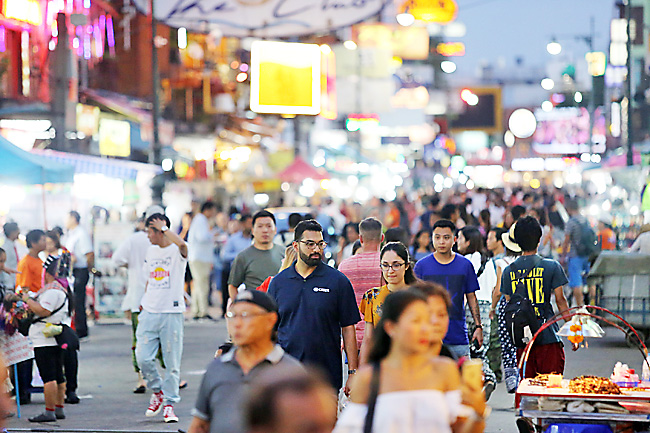Order threatens Bangkok’s charm
Khaosan is boring by day, but it’s busy by night. – THE NATION/ANN
.
THAILAND (The Nation/ANN) – Thai academics offer ‘win-win’ suggestions to maintain capital’s street culture in the war between street vendors and the authorities
Singapore has asked UNESCO to formally recognise its street-hawker culture, which would help the island-state promote it as yet another tourist attraction. In Thailand, it’s a completely different story. Prodded by the orderliness-obsessed military-led government, Bangkok authorities are determined to transform the city’s reputation for unsurpassable street food – or extinguish that reputation, as critics charge. The mobile noodle vendors and everyone else informally touting goods on the sidewalks have to clear out.
The Bangkok Metropolitan Administration (BMA) wants street vendors licensed, registered and contained neatly in designated areas well away from busy footpaths. It’s imposing military-style order in such tourist hotspots as Siam Square, Sukhumvit, Yaowarat, Nana, Khaosan and Chatuchak.
The push hasn’t gone down well with many Thais, including academics and urban planners, who regard the sheer chaos of crowded street-hawking scenes and especially the clots of food vendors’ smoky, aromatic carts as being among Bangkok’s premier attractions.
The city is being sanitised, the critics complain, while pointing out that foodies from around the world rave about the tasty yet cheap dishes they can slurp up on any Bangkok sidewalk.
.
“Bangkok is famous as the city of markets, but now many markets are dead,” said British expatriate Philip Cornwel-Smith, author of Very Thai, a well-received book exploring what is unique about the Kingdom.
“Just to treat the markets with eviction after eviction actually does big damage to parts of Bangkok’s identity and its reputation internationally.”
French tourist David Lago, making his third visit to Khaosan Road recently, found it utterly changed. It was cleaner now, he noticed, but “boring”.
“Khaosan has lost that charm of being chaotically filled with street vendors. It’s empty during the daytime,” he said, adding that he’d be back after dark, the only hours the hawkers are allowed to set up.
A network of street vendors founded to push back against the clean-up effort marched on Government House early this week with a handful of demands. Many more attended a pair of public discussions about the ruckus coincidentally organised for the same week.
One, called “Street Vendor and City: Leaving No One Behind”, took place at Chulalongkorn University.
“The management of street vending is a complex issue,” Assistant Professor Narumol Nirathron of Thammasat University pointed out. “The BMA alone can’t handle it – it’s a matter for the national agenda.
“To achieve United Nations Sustainable Development Goals, the government needs to handle this issue properly, by integrating the work of the Economic Affairs, Security, Commerce, Tourism and Sports and Culture ministries.”
Narumol and fellow academics from Thammasat, Chulalongkorn, the Thailand Development Research Institute Foundation as well as the Urban and Design Development Centre plan to present an open letter to Prime Minister Prayut Chan-o-cha asking him to reconsider street-vending regulations designed to “return the pavements to the public”.
The government’s ultimate intention is to ban street hawkers in 683 areas of the capital where they’ve long been “temporarily” permitted to do business. As of last month, they’d been shut down in 478 areas, affecting 11,573 vendors in all.
The BMA is gradually moving in on the remaining 210 areas and most recently has had Khaosan Road in its gun sights.
In their letter to Prayut, the academics note that one reason given for the cleanup was “to liberate Bangkok from a ‘disorderly’, ‘antiquated’, ‘undeveloped’ look”.
“In reality, however, a state of disorder – or order, for that matter – also depends on the management by government agencies, while an antiquated or undeveloped look has nothing to do with street vending.
“In the US and Europe, known for their advanced development, the governments are allowing more street vendors to operate because the authorities are not able to create enough jobs (for everyone). Thus, in pursuing the goal to make Thailand modernised and more developed, the government must not leave a number of people behind, as seems to be the case at present. | Phatarawadee Phataranawik |
.
 All photographs, news, editorials, opinions, information, data, others have been taken from the Internet..aseanews.net | [email protected] / For comments, Email to : Aseanews.Net |
All photographs, news, editorials, opinions, information, data, others have been taken from the Internet..aseanews.net | [email protected] / For comments, Email to : Aseanews.Net |









